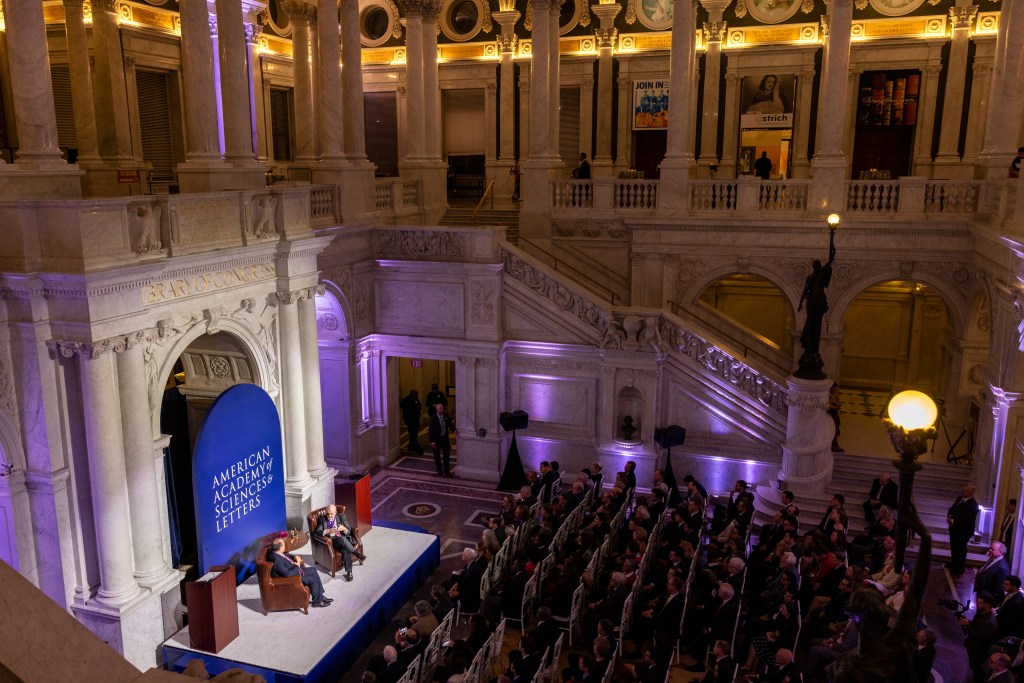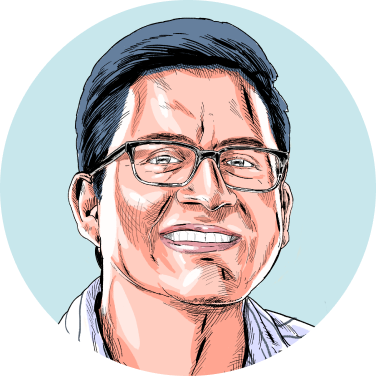Proponents of academic freedom often have to decide: Will they champion their cause from within the traditional framework of American academia, or from outside of it? A recently launched academic society is trying to do both, working closely with the existing university system while also starting something wholly new.
The American Academy of Sciences and Letters (AASL) held its inaugural investiture last Wednesday, drawing a crowd of 150 people at the Library of Congress in Washington. Several well-known scholars and free-speech advocates—including Princeton University’s Robert P. George and New York University’s Jonathan Haidt—were among the 10 recognized with a $50,000 Barry Prize and inducted as the first official members of the AASL.
The AASL launch also featured a keynote interview with author Salman Rushdie. In one of his first public appearances since his near-fatal attack last year, Rushdie received the Robert J. Zimmer Medal for Intellectual Freedom, named for the longtime advocate of free expression and former president of the University of Chicago.
The campus censoriousness against which Zimmer fought has experienced a well-documented rise over the past few years. High-profile firings and disinvitations suggest that elite higher education has become too ideologically motivated, too weary of good-faith debate over controversial topics.
For some, the answer to these problems is to counterbalance existing institutions with new ones. Watchdogs like the Foundation for Individual Rights and Expression (FIRE) and the Academic Freedom Alliance operate independently from universities, yet they keep a close eye on their practices and provide legal support to students and faculty facing censorship. A group of journalists, business leaders, and academics launched the University of Austin in 2021 with the explicit goal of advancing the “fearless pursuit of truth” (and faced considerable pushback at the time). The John and Daria Barry Foundation—which is also a major benefactor of the AASL—funds a graduate scholarship at the University of Oxford as a heterodox analogue to the Rhodes scholarship.
But there are also efforts to reform existing universities to advance the cause of academic freedom. The University of Florida—which named former Sen. Ben Sasse president earlier this year—opened the Hamilton Center in June to explore the values that “undergird a free society.” In 2022, the University of Texas at Austin launched the Civitas Institute to study ideas that “sustain a free society and enable individuals to flourish.” Earlier this year, the board of regents approved the creation of an entirely new college within the university to house Civitas.
The AASL, for its part, appears to be adopting bits of both approaches. “If ever there were a time for both/and rather than either/or, this is it,” Princeton’s George told The Dispatch. While he opposes “giving up on the academy,” he added that “we do need new structures and institutions as well as [to improve] our old ones.”
That’s the hope for the AASL: to be a new institution that reminds old ones of the principles on which they were founded. “Independence of mind” and “intellectual courage” were two phrases used frequently by AASL leadership throughout Wednesday’s investiture.
Academic societies like AASL have played a role in both academia and beyond for centuries. The American Academy of Arts and Sciences (AAAS), to name one prominent example, was founded in 1780, boasting John Adams and John Hancock among its earliest members. Today, the AAAS and other similar organizations—including the American Philosophical Society and the National Academy of Sciences—serve a variety of functions, from honoring outstanding intellectual achievements, to advising government agencies and philanthropies, to commissioning groups to study problems that universities face.
“Such academies were—and are—born at particular times in particular places to respond to the circumstances of their times and places,” said Donald Landry, professor and emeritus chair of Columbia University’s department of medicine and the president of the AASL’s board. “And yet, they are motivated by a perennial ambition: to encourage, to support, to recognize, and to honor courageous truth seeking and bold truth speaking.”
Euthanasia is one topic where the inability to speak freely is acutely felt. “That’s a topic that is increasingly becoming one where if you disagree with that point of view [that euthanasia is a right], it’s construed as not respecting the rights of patients,” Margaret Chisolm, a professor of psychiatry at Johns Hopkins Medicine and a board member of the AASL, told The Dispatch. “Divergent views have now been redefined to be bigotry, for instance, because the issues at hand are being reframed as rights.”
A typical criticism of initiatives like AASL is that they’re inherently conservative—and partisan. “Around the country, Republican legislatures have been taking a greater interest in the affairs of their state universities to counteract what they see as excessive liberalism on campus,” the New York Times wrote in 2018 about Arizona State University’s School of Civic and Economic Thought and Leadership, which was supported by then-GOP Gov. Doug Ducey. One of the main proponents of the Civitas Institute in Austin was Texas’ Lt. Gov. Dan Patrick.
The AASL, however, adamantly rejects any political classifications. “We’re not looking to make a right or a left academy,” Landry told The Dispatch. “We’re looking to, again, achieve our objectives for spectacular contributions, independence of mind, intellectual courage. Period.”
And it wasn’t just conservatives on stage last week. “I’m a social democrat to the core,” Orlando Patterson, a sociologist who studies ethno-racial relations and slavery at Harvard University, told The Dispatch after receiving his prize. “But I’ve always felt that it’s just important to be free to say whatever one wishes to say, and to be critical of both people on the right as well as people on the left.”
But even if the centers, the watchdogs, and now the new society try to remain politically impartial, these organizations—AASL included—face a question: How will they actually move higher education toward more open debate and away from rigid orthodoxies?
For the AASL, part of the answer will involve strength in numbers. This year’s Barry Prize winners were automatically inducted as members of the AASL, and Landry expects to add 50 additional members each spring for the next few years. Members will commission research and participate in working groups on topics ranging from the ongoing decline of humanities enrollment to ethics of educators.
The AASL also plans to identify and support early career academics devoted to its signature values through fellowships, as well as writing and research opportunities. And it hopes to hold up those who refuse to remain on the sidelines as models in struggles over free speech and inquiry.
It was in that vein that Landry and the board unanimously selected Rushdie—whom Landry compared to the 20th century Russian writer and dissident Aleksandr Solzhenitsyn—as the recipient of their inaugural Zimmer medal.
Rushdie—who was on the receiving end of death threats, assassination attempts, and even a fatwa from Iran’s Ayatollah Khomeini following the publication of his 1988 novel, The Satanic Verses—didn’t mince words about his belief in the continued importance of free speech. “If we can’t trust ourselves as a culture to accommodate ideas we don’t like,” he said in an interview after receiving his award, “then our ideas lose their value as well, because they become authoritarian.”







Please note that we at The Dispatch hold ourselves, our work, and our commenters to a higher standard than other places on the internet. We welcome comments that foster genuine debate or discussion—including comments critical of us or our work—but responses that include ad hominem attacks on fellow Dispatch members or are intended to stoke fear and anger may be moderated.
With your membership, you only have the ability to comment on The Morning Dispatch articles. Consider upgrading to join the conversation everywhere.